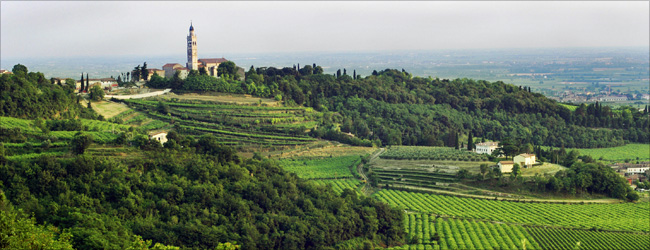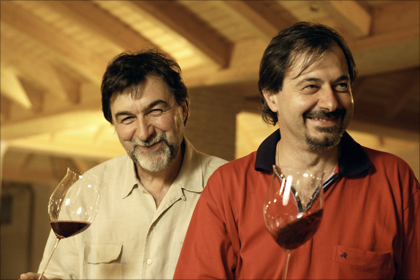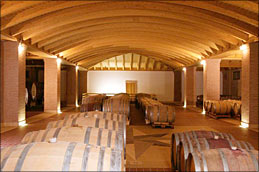We are sorry, this page has not been translated yet.
Fasoli vineyard - La Casetta

Authentic red wines still ripen in the gentle hills of Veneto and can be drunk with pleasure every day. When a local in a village hostelry pronounces that, “È il mio vino !”, it is certainly not a Cabernet Sauvignon but perhaps a Soave, or a Bardolino, this carefree, light red wine, made from native varieties such as Corvina, Rondinella or Molinara. Or a fresh, fruity Valpolicella with a fine cherry fragrance.
Traditionalists with their eyes on the future
The Fasoli vineyard has been entirely devoted to these classics of the Veneto region. The wines that mature in this cellar were designed to be drunk with pleasure every day and not to be superficially impressive. Precisely because of their proverbial authenticity, the wines of the Fasoli brothers have been receiving outstanding assessments at home and abroad for some time. The best wine with a homemade salami is probably a light Soave, and for the hearty Veronese classic, “Bigoli con l'anara”, thick spaghetti with duck ragout, it has to be a bold Valpolicella Ripasso.

A successful duo: The brothers Amadio and Natalino Fasoli. They dream of “paradise on earth” when all the vineyards in the idyllic Illasi Valley will be organically cultivated.
The Fasolis’ home is in the wine-producing village of Colognola ai Colli. Amadio and Natalino Fasoli have dark hair and neat goatee beards. They have no need to say that they are brothers. Incidentally, they are both married to teachers. For them, educating children and nurturing vines have a lot in common. They both require freedom within clearly defined limits to develop as well as they can. And both require deep roots in a good terroir.
Wine has always been part of the Fasolis
Amadio and Natalino’s grandfather was an innovative man. He kept his wines in wooden barrels and took them by horse and cart to the hostelries of Verona, Vicenza or Padua. His grandsons have combined the strong, still largely intact wine-producing tradition of the Veneto region with a modern quality mindset and so become top producers.
But one thing has not changed in Veneto in the last 100 years: Life and wine have always been one and the same thing for the Fasolis. “The wine has always been here. Every day. When I smell our Recioto di Soave today I see myself as a child again at the festively decked Sunday dinner table,” says Natalino Fasoli. When visiting the Fasolis it quickly becomes clear: The terroir is not just restricted to the microclimate and soil. The people are part of it.
Pesticide allergy leads to organic wine
The year 1980 marks an important turning point in the history of the vineyard. In the years up to then, the parents suffered increasingly from allergic reactions because of the pesticides used on the vineyard at the time. So, they started using green manure and let grass, flowers and wild herbs grow between the rows of vines. At that time, they were total pioneers in organic cultivation in Italy. When they saw that this form of cultivation worked, even in the Veneto region with its high rainfall, they finally converted the entire business to organic in 1984.
Today Natalino Fasoli is already dreaming of the time when all the vineyards in the idyllic Illasi Valley will be organically cultivated. “Then, we really would have paradise on earth here,” he says. Anyway, the children of Natalino and Amadio Fasoli, who already work on their parents’ vineyard, are convinced that the route they have taken is the right one.
The Amarone – a dream wine

This is where the precious Amarone wines mature. Plenty of patience and skill result in outstanding wines.
The soil quality in the Illasi Valley differs from plot to plot. So, the Fasoli family spent lots of time finding the right grape variety for each of their sites. For the vineyard’s top wine, the Amarone, only the most mature and healthy grapes are chosen. After being carefully harvested, they are allowed to dry for three months. As a result of this concentration the wine gains complexity and body. The high sugar concentration means that maturation happens only slowly. The wine is matured in wooden barrels where it is developed and refined for three years. An age-old process that has been constantly developed and optimised for the La-Casetta-Amarone. In management courses, this would be called “sustainable progress”.




